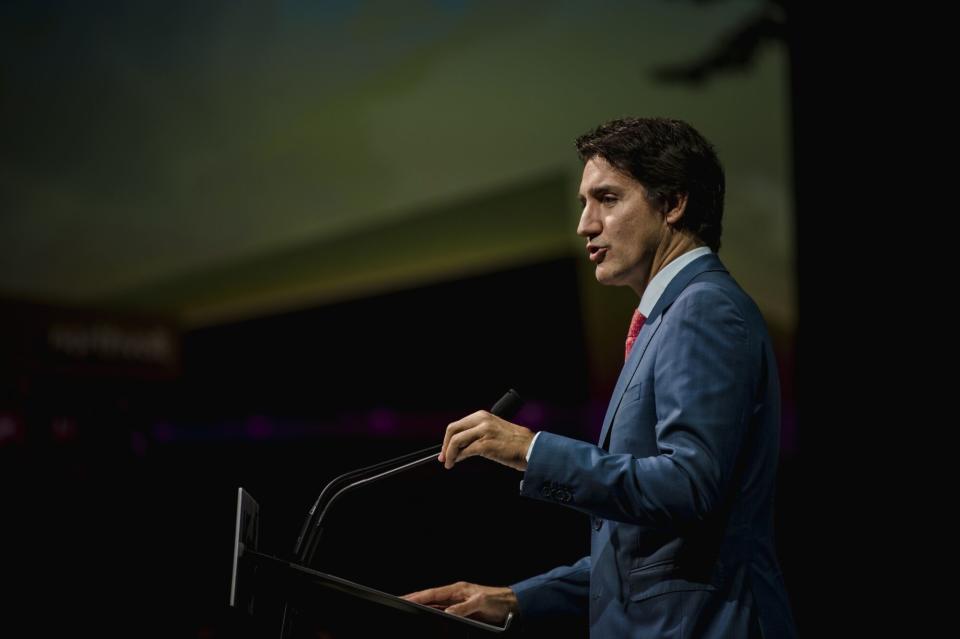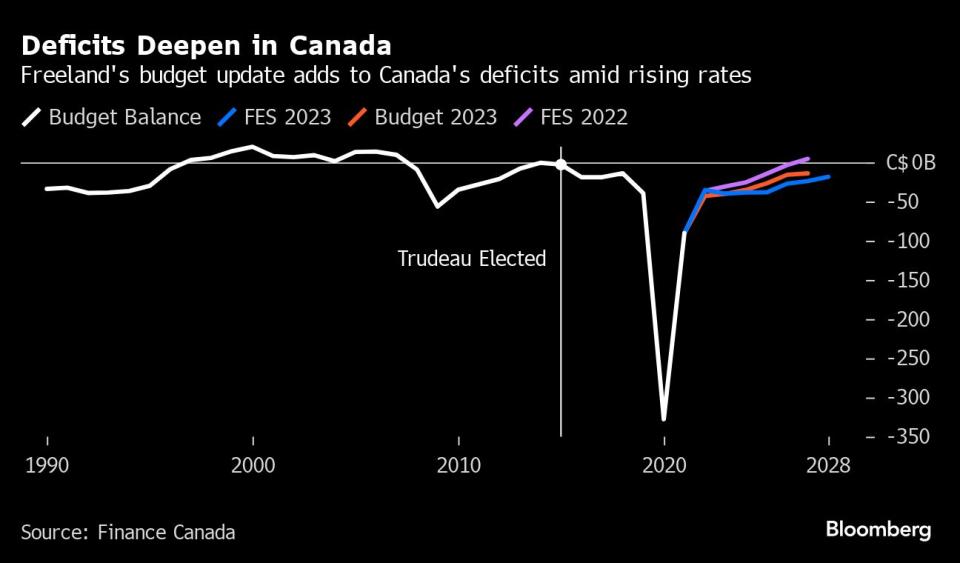Canada to Run Deeper Deficits as Trudeau Tackles Housing
(Bloomberg) -- Prime Minister Justin Trudeau’s government revealed billions in new spending on housing programs and industrial subsidies, increasing Canada’s budget deficit amid the dual pressures of higher borrowing costs and a slowing economy.
Most Read from Bloomberg
McKinsey and Its Peers Are Facing the Wildest Headwinds in Years
Hulu for $1, Max for $3: Streaming Services Slash Prices This Black Friday
Sam Altman, OpenAI Board Open Talks to Negotiate His Possible Return
Nvidia Fails to Satisfy Lofty Investor Expectations for AI Boom
The total cost of the new tax and spending measures is C$20.8 billion ($15.2 billion) over six years, according to a fiscal update from Finance Minister Chrystia Freeland, who’s planning to borrow more at a time when many economists are concerned with rising interest costs and the risk of a recession.
Tuesday’s economic statement doesn’t include a timeline for a return to a balanced budget. It also forecasts a slower decline in Canada’s ratio of debt to gross domestic product: it’s set to rise to 42.7% next fiscal year, before falling to 39.1% by 2028-29.
The lack of a more ambitious plan to reduce debt underscores the political circumstances faced by Trudeau and Freeland. Their Liberal Party is slumping in opinion polls against their Conservative opponents, who have hammered the government on housing affordability and the cost of living crisis, as well as on fiscal matters, accusing them of stoking inflation with deficits.
In the face of that criticism, the government is placing its housing initiatives at center stage. Its plans to add housing supply to improve affordability include an additional C$15 billion in low-cost financing for apartment construction, a C$1 billion investment for non-profit housing providers, the removal of the goods and services tax from new rental housing projects, and repurposing some federal lands for housing.
Freeland framed her economic statement as a “responsible fiscal plan” and touted the Canadian government’s relatively small deficit and debt compared with other Group of Seven nations. The government also pledged to keep deficits at less than 1% of GDP from 2026-27 onwards.
“We do need to find balance between making the investments that Canadians need right now, doing it in a fiscally responsible way,” the finance minister told reporters in Ottawa. “That’s the balance we struck today.”
Debt-service payments are forecast to jump to 10.8% of revenues, according to Bloomberg calculations, pushing past the so-called Dodge rule next year — named after former Bank of Canada Governor David Dodge, who has urged the government to keep interest costs below 10% of revenue.
The government also proposed C$50 million over three years to help local governments enforce restrictions on short-term rentals such as those provided through Airbnb Inc. The government believes that will help make more apartments available to long-term tenants, alleviating some pressure on the rental market. It plans to deny income tax deductions when short-term rental operators aren’t compliant with local rules, starting Jan. 1.
‘Skeptical’ on Debt
Freeland’s new base-case forecast suggests the government still believes Canada will be able to pull off a soft landing for the economy, avoiding a serious recession that would necessitate major extra expenditures to support heavily indebted Canadians as they contend with mortgage payments resetting at higher rates.
“They’re being prudent, but they’ve got no leeway, let’s be honest,” David-Alexandre Brassard, chief economist of CPA Canada, said in an interview.
In its upside scenario, the government sees underlying inflation falling faster than expected by private-sector economists, which would allow the Bank of Canada to cut interest rates sooner. A downside scenario sees a shallow recession in Canada, with persistent inflation leading to higher rates for longer. That’s a potential headwind for revenues as household and corporate income growth slow.
“We remain skeptical that the federal government can achieve this falling debt ratio over the medium term,” Randall Bartlett, senior director of Canadian economics at Desjardins Securities, wrote in a report to investors. “With every new fiscal forecast published, the federal government takes any windfall of the prior year and fills the gap with new spending. This leaves it vulnerable to an economic downturn.”
The government also increased its projected borrowing costs. Canada 10-year bond yields are expected to average 3.3% next year, up from the 2.9% forecast in Freeland’s spring budget.
Freeland backed away from a proposal to wind down the Canada mortgage bonds program, which the government had floated earlier this year as a potential cost-saving measures, but which was opposed by many financial market players.
Read More: Canada Shelves Proposal to Eliminate Mortgage Bond Program
(Updates with chart, additional information on government’s deficit goal and quote from Desjardins economist.)
Most Read from Bloomberg Businessweek
How Elon Musk Spent Three Years Falling Down a Red-Pilled Rabbit Hole
More Americans on Ozempic Means Smaller Plates at Thanksgiving
Guatemalan Town Invests Remittance Dollars to Deter Migration
©2023 Bloomberg L.P.




